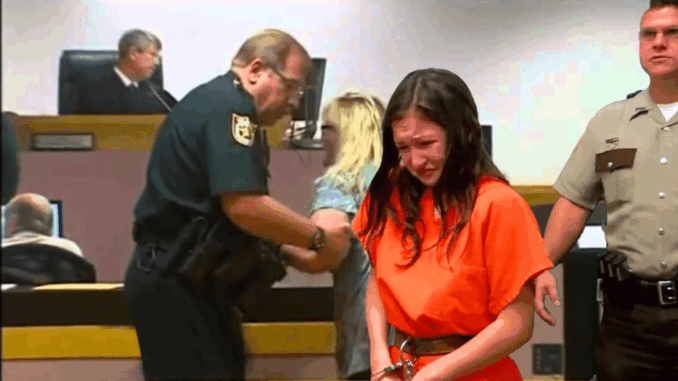
She was in his cell, waiting to be executed, and he asked as a last

The United States, one of the countries with the highest number of incarcerated people in the world, faces a reality that has generated controversy,
international criticism, and profound reflection on its judicial system: at least 79 minors under the age of 14 are serving life sentences without the possibility of parole.
The figure, revealed by human rights organizations such as Human Rights Watch and the Equal Justice Initiative,
has sparked debate about juvenile justice and the moral limits of criminal punishment in the United States.
The cases contributing to this statistic are as diverse as they are disturbing. Some minors were charged with homicide during robberies, others with complicity in crimes where they didn’t even use a weapon. In most cases, they come from communities marked by poverty, neglect, structural racism, and domestic violence.
One of the most emblematic examples is that of Lionel Tate, arrested at age 12 for the death of a 6-year-old girl during a simulated wrestling match. Although his sentence was later reviewed, his case sparked a debate about the trial and punishment of minors as adults.
Life sentences for children violate the most basic principles of justice and children’s rights,” says Juan Méndez, former UN Special Rapporteur on the Elimination of All Forms of Discrimination against Torture. “These minors have not yet fully developed emotionally, mentally, or morally. Subjecting them to a lifetime of imprisonment is tantamount to denying them any possibility of redemption or rehabilitation.”
In contrast, judicial authorities in several states argue that certain actions, even if committed by minors, have such serious consequences that they merit the maximum penalties. States like Florida, Michigan, and Pennsylvania top the list of states with the most children sentenced to life imprisonment.
The U.S. Supreme Court has issued significant rulings in the last decade. In 2012, it declared mandatory life sentences for juveniles unconstitutional, and in 2016, it ruled that this ban should also be applied retroactively. However, many rulings have yet to be reviewed.
Civil organizations continue to fight for the review of these cases and the implementation of more humane policies. They propose alternatives such as restorative justice, social reintegration programs, and periodic review of sentences.
Childhood should be a place of learning and redemption, not an unlocked prison cell,” says Bryan Stevenson, a civil rights attorney. “When we condemn a child to die in prison, we’re saying they’re incapable of change, and that flies in the face of all human and scientific logic.”
In a society constantly debating justice, security, and second chances, the case of the 79 minors sentenced to life imprisonment serves as a reminder that a nation’s humanity is also measured by how it treats its most vulnerable children.
Judge Orders Release of Documents in Trump Special Counsel Case 
Washington, D.C. — In a significant development, Chief Judge James Boasberg has ordered the unsealing of previously confidential court documents tied to Special Counsel Jack Smith’s investigations into former President Donald Trump. The move is expected to reveal new details about long-running legal battles over attorney-client privilege that shaped two of the most politically charged cases in recent history.
The order applies to both Smith’s 2020 election investigation and the classified documents case. Judge Boasberg instructed that opinions, orders, and docket sheets related to disputes over attorney-client privilege in the election case be made public.

For the classified documents case, the court will unseal docket sheets and related rulings about Trump’s lawyers’ testimony. However, the Justice Department has been allowed to submit redactions before publication to protect sensitive grand jury materials.
Boasberg explained that much of the information has already been partially disclosed in public filings or through Trump’s own legal submissions, reducing the justification for ongoing secrecy.
Attorney-Client Battles and the “Crime-Fraud” Exception
The disputes at the heart of these cases stem from Special Counsel Smith’s aggressive use of a Washington, D.C., grand jury to compel testimony from Trump’s attorneys.
Former Chief Judge Beryl Howell, appointed during the Obama administration, repeatedly ruled against Trump, including forcing attorney Evan Corcoran to testify despite privilege protections. Howell applied the crime-fraud exception, which permits privileged communications to be used if they were made to advance a crime.
This was a devastating setback for Trump’s defense at the time, raising broader concerns about the erosion of one of the most fundamental legal protections in the U.S.
Broader Legal Context
The classified documents case was eventually dismissed in July 2024 by District Judge Aileen Cannon, who ruled that Jack Smith’s appointment and unlimited funding were unconstitutional. Although Cannon later revisited her decision, she upheld her ruling. Following Trump’s reelection, the Justice Department abandoned appeals in both cases.
Boasberg noted that the government itself had already revealed that at least 25 witnesses withheld information under attorney-client privilege during the election probe, and that courts issued orders compelling production of some of that material.
What the Public Will See
While key names and sensitive details will likely remain hidden under redactions, the release will provide the public its first full look at how prosecutors compelled Trump’s lawyers to testify against him — an unprecedented step in modern U.S. legal history.
Legal analysts say the documents could reignite debate over whether the Justice Department’s handling of the Trump cases represented legitimate law enforcement or political overreach.
For critics, the ruling offers a rare window into what they describe as “lawfare” tactics used during the Biden administration. For others, it represents transparency in cases that tested the boundaries of attorney-client privilege and executive power.
Next Steps
The Justice Department must now review and submit redacted versions of the responsive documents before they are released to the public. The timing of the release is not yet clear, but it is expected to mark a pivotal moment in understanding the legal strategies behind two cases that dominated U.S. politics for years.
As Judge Boasberg’s order takes effect, Americans will soon be able to examine, in far greater detail, how one of the nation’s most sacred legal protections was pierced in the pursuit of a former president.